Belgium: Travelling through the revolution at Second National Day of Solidarity with Venezuela
- 21 November 2008
150 people gathered in Brussels on Saturday, November 15 to celebrate the 10th anniversary of the revolution. At the same time they drew up a balance sheet of the gains of the revolution and discussed the future of Venezuela and the Latin-American continent. The great diversity of participants is the first thing to be noticed: Latinos, Dutch and French speaking people, youth and trade unionists, all of them looking to Venezuela as an example and the beginning of a better and more just society, socialism, in the making.
The activity started with an opening speech by Guy Tordeur, the regional leader of the Christian union. “Casino capitalism is in crisis. That’s why alternative experiments as we see in Venezuela are so important and need more publicity”. Indeed the number of activities and interest for Venezuela in trade union circles is on the increase. We are witnessing a greater involvement of some unions in search of a left alternative. Tordeur also issued a call for a larger and better organized international union movement in this globalised world. He stressed the need for cross-border collaboration and concluded that the struggle in Venezuela is also our struggle. Finally he pleaded also for the international recognition of the UNT by the unions.
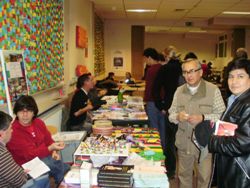 |
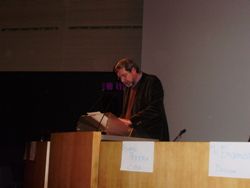 |
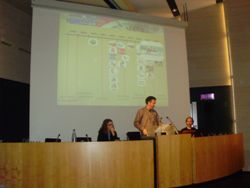 |
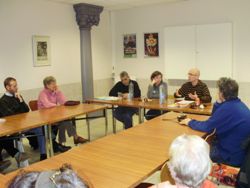 |
A debate on the international economic crisis followed, with the ambassador of Bolivia, diplomats of Venezuela and Cuba and also Eric Toussaint, chairman of the Committee for the Cancellation of the Third World Debt taking part.
The ambassador of Bolivia, Mr. Enchauste, highlighted the paradox of capitalist countries that have been forced to engage in nationalization as a result of the financial meltdown. This comment was widely applauded. What a contrast when a Latin American country nationalizes part of the economy! Then the capitalists reacted with indignation. Our nationalizations insisted Mr. Enchauste want to serve the interests of the people; theirs are aimed against the people. The benefits from our nationalizations finance the struggle against illiteracy, the building of houses and healthcare. He also stressed the importance of growing collaboration and integration of the continent to achieve the goals of the social and economical revolution.
The Cuban diplomat, Mr. Perera, dealt with the role of the socialist parties around the world. They must play their role in defending the interests of the working class. The financial crisis raises in the minds of a large layer of the public the irrationality of this economic system than cannot be reformed. He also indicated that we needed to think urgently about the future, not only of the economic system but of the whole of humanity. “In 2030 we will need two planets to be able to continue at this rate. Two thirds of the world still live in terrible conditions”. He noted how the banks were given vast amounts of financial help when much more important social projects are starved of any serious financing.
Eric Toussaint explained that we cannot speak solely of a financial crisis. This is a crisis of the system itself. This system cannot be reformed but needs to be radically transformed. This is a truly international crisis, he repeated. His predictions for Latin America are bleak if the continent does not seriously consider the alternatives. The crisis will push down the prices of exports and will reduce incomes. He added that different banks in Latin America are US property. That’s why it is important to look at the example of President Chavez and to nationalize the banking sector as much as possible.
Robert Bonillo, advisor of the Venezuelan Minister of Planning was also present, despite the intense election campaign. Proudly he explained that the GDP of Venezuela had grown by 4.6%, the minimum wage by 10% and that the revolution had succeeded in cutting unemployment from 20 to 7%. The nationalization of the oil company PDVSA, the steel and the cement industry, makes it possible to finance many social projects and stimulate the building of new homes. The profits of those companies are no longer devoured by just 2% of the population but are shared by the full 100%. He also mentioned the importance of the ideological struggle on a world scale. “Neoliberalism has had hegemony for a long time. For years in Venezuela we have pushed forward ideological elements to the people. The solution to this crisis depends on ideology”.
After this debate the workshops started. The one on the ‘misiones’ attracted most of the people. Pol De Vos, gave a panoramic picture of the social reforms. This was completed with the concrete experience of Alessandra Moonens, a Belgian doctor who was active in the health system in Venezuela for six months.
Another workshop dealt with the role of the workers in the revolution. An activist of the Christian union, Sebbe Vandeputte gave a first hand account of the struggle at Sidor and against the subcontractors. Kris Vandael, spokesperson of the socialist union at the Total refinery reported on the first official trade union mission in Venezuela. Georges Spriet and Wim Benda (former international observer of the presidential elections in 2006) gave a good picture of democracy at work in the country.
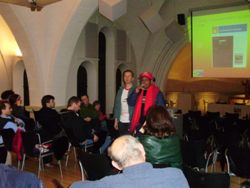 |
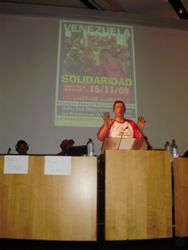 |
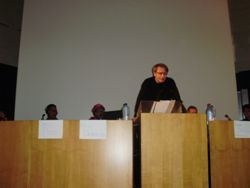 |
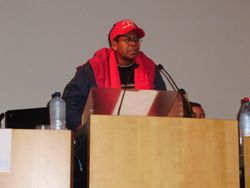 |
During the breaks the many participants had the opportunity to visit the information stalls of for instance the Friends of Cuba, Iniciativa Cuba Socialista, Vrede and others. The Hands Off Venezuela stall sold 140 euros’ worth of material.
The day ended with a meeting on the balance sheet of 10 years of revolution. Speakers were Robert Bonillo, Paul-Emile Dupret and Freddy Pulecio. During his speech Erik Demeester of the Hands Off Venezuela campaign insisted we needed to change the image we had on the relationship between Chavez and the people. The real engine of the revolution is the revolutionary mass of workers, peasants, urban poor and young people. It is their action, their active involvement in politics that pushes the revolution forward. Erik also warned of the fifth column of bureaucrats and reformists within the Bolivarian revolution who are a brake on the process and do not want it to be completed.
Jesus Pino of the Revolutionary Front of Steelworkers was the special guest of the day of solidarity. He underlined the utter importance of workers’ participation, control and management in the nationalized industries. No company can be called a socialist company if there is no workers’ management. The experience in Venezuela teaches us that it is also a more efficient way of working. Decisions are taken by the workers themselves and not by a small number of managers. This increases production, efficiency and involves workers in the production process.
Erik Demeester at the end thanked all the volunteers, the speakers and the interpreters. Thanks to a serious preparation and brilliant PowerPoint presentations a different and true picture was given of revolutionary Venezuela. A ‘hot’ Latina Fiesta concluded the day. Forward to a third day of solidarity!
See more pictures here.

 Please help build the campaign by
Please help build the campaign by